Peter MALONE
Du, Sie, Er & Wie/ The Four of Us
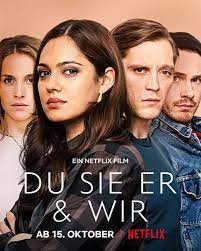
THE FOUR OF US/ DU, SIE, ER & WIE
Germany, 2021, 88 minutes, Colour.
Nilam Farooq, Louis Nitsche, Jonas Nay, Paula Kalenberg, Tim Oliver Schultz.
Directed by Florian Gottschick.
A German film, a combination of tongue in cheek and serious themes.
The premise of the story is that two couples are persuaded to change partners for a month, an experiment. However, it is been masterminded by one of the participants, wanting to be the subject of a special feature she would write for a magazine and get promotion. The other three do not realise this.
We are introduced briefly to each of the four characters, establishing their personalities and style. Then they will go to the holiday house, the rendezvous for the reunion and assessment of the experiment.
One of the difficulties is that in the change, one new pair have fallen in love and the woman wants a separation from her former partner. The other complication is a pregnancy test and an indication that the journalist is now pregnant – putting pressure on the new partner. However, further complication when the original partner declares that he is unable to have children.
Some comedy, some angers, some criticisms, some challenges – and a postscript indicating that the two new partners are now pregnant, that the man unable to have children, an actor, now appears in a soap opera resembling something of what he went through, and the journalist has achieved her promotion.
- The premise of the story, the two couples, changing partners for a month, an experiment, friendships and love, the culmination of the month?
- The contemporary German city, views, the river, buildings, apartments, the magazine editorial? The contrast with the countryside, the roads, the fields, the house, the beach and the water? The musical score?
- The introduction to each of the characters, Nils, the child and the drawing, and, to claiming, the camera, rehearsing, Maria, busy with the shopping, Janine, her role in the office, possible promotion, the relationship with Anton? The boss and Anton going to the awards ceremony, the later picture?
- The ages of the characters, Maria and Nils together, Janine and Ben together?
- The situation at the house, tensions, wanting to tell the truth? Maria, the relationship with Ben, love, breaking with Nils? Nils, self-assured, the touch of the cynic? Ben, the relationship with Janine? Janine and her organising of the experiment?
- The drama is during the night, Maria and her angers, discovering the pregnancy test, two possible fathers, Nils and his reaction, Ben and the revelation about his inability to father a child? Janine, tantrums, vomiting at the table, cleaning up? The night, lying down, the conversations? Janine disappearing, Ben upset, going on to the beach, the search, her turning up after jogging, Nils and Ben and the fight in the water?
- In the sauna, the discussions about attractions, relationships, imagination, Ben and Nils and the kiss?
- The news that Nils was about to propose to Maria? The effect on her? The break up between Ben and Janine? Maria and Ben?
- The phone call, the editor of the magazine, the revelation that Janine had set everything up, no pregnancy?
- The group going off, Ben on his own, Maria and Nils together?
- Nils and Maria watching the television, her being pregnant, then the soap opera and reflecting the testing? Janine and her promotion?
- And the comic recollections during the final credits?
Crimes of the Future
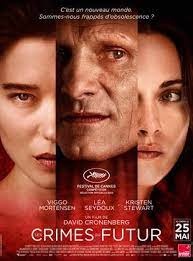
CRIMES OF THE FUTURE
Canada/Greece/UK, 2022, 107 minutes, Colour.
Viggo Mortensen, Lea Seydoux, Scott Speedman, Kristin Stewart, Don McKellar.
Directed by David Cronenberg.
Film buffs will be alert when they see in the name of the director, David Cronenberg, who has also written the screenplay for this film. Cronenberg has been making films for over 40 years, a Canadian, starting with small budget films with such titles as Shivers, Rabid, The Brood, focusing on horror, psychology, bodies. Over the decades he has made a range of films including a version of Stephen King, The Fly, the, bizarrely erotic, Crash, and a kind of alternate universe, Existenz. In 2022, he has returned to some of these early themes.
For audiences not familiar with David Cronenberg, it might be recommended that they go back to some of his earlier films which will prepare them for this one should they wish to venture into it.
The film is set in an extraordinarily dingy future, old wharves, shipwrecks, dark interiors (and somebody noticed, not a computer in sight). The atmosphere is dark in so many ways. And, yet, it is interesting to notice the title, a kind of moral judgement it would seem on the characters and their behaviour.
It should be noted that this is not a film for the squeamish, for those who find the visuals of close-up surgery something that they cannot or do not want to watch. There are many scenes in this vein.
And the characters? The focus is on a reclusive performer, Saul Tenser (Viggo Mortensen who has appeared in several Cronenberg films). He is in pain. To ease the pain and to help him swallow and digest, he sits in a skeletal-looking movable chair. And he is cared for by Caprice (Lea Seydoux), his partner in his performance arts. When Saul gets out of his chair, he is dressed in a black cloak, a black hood, mirroring The Grim Reaper.
And the sequences, and there are many, where he performs our pain-inflicting, with a strange audience of the curious and the photographers, Caprice manipulating surgical knives on Saul’s body, opening him up, extractions… And, there are several similar sequences but, a climax, where a little boy who has been seen at the beginning of the film, then smothered by his mother, promoted by his father (who has a factory manufacturing purple chocolate which has deadly effect), is featured for the audience for an autopsy. Also in the background are two officials of the Registry for Organs and who participate in festivals of such pain performance (Kristen Stewart and Don McKellar).
The film is obviously a parable about human nature, pain, exploitation, mutilation, the picture of an alternate universe – and a challenge to reflect on how much of this future and its crimes are already present in our contemporary world.
- The career of David Cronenberg? Themes, the body, horror, erotic? His career journey? This 21st-century entry?
- The title, the moral judgement about the activities? The body experiments, art, voyeurism, sadism, experiments? The performers? The observers and photographers, audience? The film’s audience?
- The setting, the near future, dingy, narrow, the shipwrecks, the interiors, offices, performance spaces, homes and apartments? The initial openness of the beach and the sea? Leading to darkness? Minimal phones, no computers…? The musical score?
- The tone of the opening, the little boy, his mother, his eating the basket, the foam, lying down, his mother killing him? Her joy? Calling her husband, his hurrying, his grief? And the later focusing on his death, the performance of an autopsy, the mystery what would be found? The father promoting the autopsy? Trying to persuade Saul? The other authorities?
- The introduction to Saul Tenser, his appearance, in the shell -like container, with the strange chair for his movements? His physical state, difficulties in eating, pain? The revelations that he was a performer? Art? Relying on his pain?
- Caprice, her presence, assisting him, her personality, participating in the performance? Supporting him?
- The visuals of the performance, Saul’s body, Caprice and her control, the cutting, the opening, the entrails, the removal of organs? The examination of organs? The observers, the photographers?
- The role of pain in the near future, the role of art and performance? What audiences wanted from such performances?
- The members of the registry for organs, with that, his working with Timlin, ambiguities, authority, the discussions with Saul and Caprice? Approval? Disapproval? The organisation of the pageants, the awards? The ambiguous meetings with Saul, Timlin, her personality, her voice and utterance, her attitude towards Saul, advances on him?
- The character of Cope, the meetings, in the dark, his admiration for Saul, his authority, the discussions about the autopsy?
- Lang, preparing the chocolate, his factory, the man eating the chocolate and dying? His response to his son’s death? To his wife? The idea of the autopsy? The approach to Saul and? The discussions, the motivations?
- The performance of the autopsy, the audience, the incisions, opening, the entrails, the messages? For whom? Lang and his reaction?
- The two women at the factory, stripping, wanting to become involved in performance? Their observing the autopsy? Their weapons, the killing of Lang?
- Caprice, her care for Saul, the strength of the relationship, entrepreneur with the performances, the discussions with the officials for organ registration? Meeting up with other interested performers, the woman, and the mutilation of her forehead? Yet her persevering, the autopsy?
- The ultimate effect on Saul, the art, the performances, his health, unable to eat, wanting to die, Caprice offered him the chocolate? His death?
- The effect for an audience of immersion in this future/alternate, pain-oriented, voyeuristic, pessimistic world?
At Bertram's Hotel/ 2007
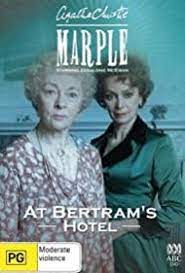
AT BERTRAM'S HOTEL
UK, 2007, 85 minutes, Colour.
Geraldine McEwan, Martine McCutcheon, Stephen Mangan, Francesca Annis, Mary Nighy, Charles Kay, Ed Stoppard, Nicholas Burns, Mica Paris, Peter Davison, Polly Walker, Hannah Spearritt, Danny Webb.
Directed by Dan Zeff.
The second television version of this Christie story, featuring Miss Marple, the first being a more faithful rendering of the book and starring Joan Hickson. There was great attention to detail about the old style of Bertram’s hotel and regrets about the changes for the modern era.
This film is brighter and more colourful, introducing Louis Armstrong at the beginning, and he and his band doing a rehearsal, Miss Marple liking the jazz. And there is an American singer, with interludes from Cole Porter and the Gershwin’s. Bertram’s Hotel had changed.
This version actually keeps the central core and the identity of the murderer, better explanations of the manner of the killings, the motivations.
However, there are all kinds of changes, not local robberies of trains but rather robberies within the hotel, art forgeries and dealings, also jewel thieves, and, like the Geraldine McEwan version different emphases, introduction of Nazi themes, the Butcher of Riga masquerading as a cleric, the romantic connection of the earlier story now becoming a Nazi Hunter.
Miss Marple is helped in this version by one of the maids, Jane, an interesting character portrayed by Martine McCutcheon – who is attracted by the very awkward inspector, played by Stephen Mangan.
So, a variation on Agatha Christie’s novel, some drastic changes with characters, but keeping the core murder and motivation.
- The popularity of Agatha Christie stories? Miss Marple stories? The different versions of this story?
- The postwar period, the old hotel, the flashback to 1891 and Miss Marple’s visit, the retaining of the old, the changing into the new, decoration, artwork, afternoon tea, rooms…?
- Louis Armstrong, jazz, Cole Porter and Gershwin songs? Miss Marple enthusiastic?
- Miss Marple coming for the holiday, standing and observing, all the guests arriving, her listening, noticing, assessing, the friendship with Jane, Jane assisting her in the detection, the first victim, going to the roof, the issue of the hats and hair, room 123, the Nazi insignia in the room, the discussions with Inspector Bird?
- Miss Marple and her friendship with Selina, the conversations, information? Selina, the painting, her jewellery being stolen?
- The range of guests, Louis Armstrong and the band, the rehearsals? The American singer and her performances, hostility towards Bess Sedgwick (and the revelation about the husband)? The interchangeable twins, one left-handed, one right-handed? Bess Sedgwick and her reputation? Elvira and her relationship with her mother, tense, her dead father? The Canon? Absent-minded? And the German hat-maker? The range of suspicions?
- The death of the maid, theories, the revelation that she was informing for the Nazi Hunter, but her knowledge about the money, blackmailing Elvira? Her death, the hat, the unkempt hair?
- The hat-maker, prissy and fussy, his hats, his collapse, his taking photos, audience suspicions of him? The truth, the persecution by the Nazis, his family and the loss of paintings, helping the Nazi Hunter, photographing the canon, the unmasking, and the recovery of his paintings?
- The driver, friendship with Bess, with pirate? Suspicious? The Nazi insignia? The revelation that he was a Nazi Hunter? The expose of the Canon?
- The twins, present, left-hand, right-hand, the holding of the paper, the revelation about the watch ? Miss Marple’s observations? The revelation that they were thieves?
- The manager of the hotel, the clashes with Inspector Bird, the putdowns? The exposure of the end? The robberies, the paintings, the room, money coming in? The piano and the painting?
- Jane, her background, working, opportunities, curiosity, the friendship with Miss Marple, helping her with the investigations, the dangers? Meeting Inspector Bird, his awkwardness, his work, listening to Jane and Miss Marple, the attraction, the happy ending?
- Bess Sedgwick, her late husband, the declaration of the will, the lawyer, his shady dealings, Elvira, the inheritance divided into three? Ireland, the background of Mickey Gorman, marriage, no divorce, repercussions for the inheritance? The reading of the will? Selina getting the picture? Bess returning, early, the lawyer burning the papers, the police arriving, arresting the lawyer?
- The sniper, everybody watching, everything staged, room 123 and the rifle, the locker room, the solution of what happened with the lock? Everyone observing, Mickey being shot, the role of Bridget? Bess and her explanation, taking the blame? The truth, Elvira and the shootings, the motivation, money, using Bridget?
- The old hotel and the guests, style of life, postwar, thieves, Nazi hunters, murder?
Time/ BBC
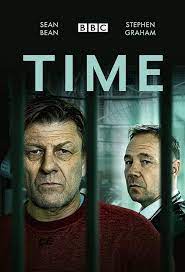
TIME
UK, 2021, 3X 55 minutes, Colour.
Sean Bean, Stephen Graham, Jack McMullen, Siobhan Finneran,, Sue Johnston, David Calder, Hannah Walters.
Directed by Lewis Arnold.
This is a very impressive television series, covering three episodes. When audiences see the name of Jimmy McGovern as the writer, they will be reassured, remembering his writing for almost 30 years, the film, Priest, various series like Cracker, and the impressive story of a priest in Liverpool, played by Sean Bean, Broken.
Commentators note McGovern’s Catholicism and his pervading themes of guilt and redemption.
This is a prison film, Sean Bean playing Mark, sentenced to prison after knocking down a cyclist and killing him, drunk. He has gone to the police, surrendering, accepting his sentence. Interestingly, dramatically, the flashbacks to this incident are kept till the third episode. Mark is a teacher, was alcoholic, has given up alcohol, goes through the procedures in prison, shares a cell with some young prisoners, attempting some help, but victimised by some of the bullies and an attempt at constant conscript in him to make drug contacts.
In the meantime, there is also a focus on one of the prison guards, Eric, played effectively by Stephen Graham. His son is in prison, has been bashed, and Eric gets his son transferred to another prison for his safety – but, the safety has a price, the main dealer amongst the prisoners pressurises him to bring drugs into the prison. And, for the most part successful, his wife understanding what he’s doing, but his prisoner son rather shocked. Eventually, his superiors put two and two together and Eric is arrested and tried, sentenced but allowing for his otherwise impeccable reputation as a guard.
There are portraits of other guards, and of many of the prisoners, one of Mark’s cellmates suicidal, the other brooding over the person he killed. There is also a nun, a prison chaplain, who organises a meeting between the young man and the parents of the man he killed, an attempt a restorative justice, but not successful.
On the human level, Mark’s wife has left him and wants to remarry, has been keeping his teenage son from him though he visits his father in prison and talk to him on the phone. He also has visits from his sympathetic parents, and news that his father has had a stroke but is prevented from phoning him, the chaplain making all the contacts, arranging for Mark to go to his funeral. This is stopped because his cellmate had allegedly discarded a phone but had hidden it in a computer. Mark is partly blamed. However, he writes a eulogy which is rid of the Gen and here in the prison chaplain have quite ceremonies together in the chapel.
The third part of the series focuses on the funeral, on Mark being sent to address a group interested in restorative justice, his refusing to make the drug connection during his journey, and is bashed. However, he maintains his integrity. By contrast, Eric then is arrested and sentenced.
There is a postscript where Mark means the meets the wife of the man he killed, unable to forgive him, but saying that she would try for the future.
A very strong portrait of prison life, criticisms of the management of prison life – but the portrait of two men, situations, guilt, breaking the law, sentenced, possibilities for redemption.
- The impact as a miniseries? Themes, performances, issues?
- The prison setting, entering into the prison, the van, the interviews, examinations, clothes, to cells, the period of induction, permanent cells? Life in the cells, the shared cell? The gatherings, the meals and lineup, issues and drama? The contrast with the police officer, his home, suburbia, driving to work, his duties, supervision, boss? The chaplain and the meetings? The violent sequences? The musical score?
- The initial focus on Mark, his age, background as a teacher, manners, dangerous driving, for years, entering into the prison, the cell, the experience with Bernard, erratic behaviour and talk, cutting himself, calling the authorities, his later return, suicide? The ordinary way of life, the guards, calling them boss, going down to lunch, bullying, the prisoner snatching his bread roll, same prisoner cutting off of the phone? His phone call to his wife, her estrangement? Phone call to his parents, concern about his son? The regulations about not talking with him or his visiting the prison? His parents coming to visit him, the support?
- Prison brutality, the prison guard, the story of his son, the threats in prison, he and his wife visiting him, the transfer, the prisoner brutalising him, the guards physical attack, the revelation that they knew where the son had been transferred?
- The prison chaplain, the nun, her appearance, talk, inviting Mark to the meeting?
- Eric and his son, transferred to the next prison, yet the inmates knowing what had happened, the news of his son being bashed, Eric and his wife going to see their son? His decision to collaborate with Jackson, the rendezvous, collecting the drugs, delivering them, their being distributed, the prisoners using them? The guards and dealing with erratic cases? Eric, his wife, his being trapped, further drug deliveries?
- Mark, the continued brutal treatment, Jackson and his advice, getting Mark to punch his hands, the taking of the food, the fight, Mark biting his opponent’s ear? Before the authorities, Mark saying it was friendly banter? The bully’s stepping back, especially at the phone?
- Mark’s wife’s visit, wanting a divorce? His parents coming, his battered face and his refusal to come down, Eric making excuses, his mother’s phone call?
- The new cellmate, Daniel, the visitors and his making his appeal, frustrated? Mark talking to him, advising him, the chaplain and her suggestion for restorative justice mediation, Eric presiding, the parents of the dead man, Daniel telling the story, lack of money, the victim and his attitudes, outside, boxing skills, Daniel’s motivation? The family not accepting his story? Returning to his cell?
- The prisoner who couldn’t read, asking Mark to write on his card, Mark offering to teach him, the words on the card, love, the prisoner happy? His later support Mark, rescuing him after the bashing? And the Farewell, and the promise of writing?
- The emotional impact of the episode of Marks father’s death, trying to make the phone call, being cut off? The irony of Daniel, bringing in the phone, Mark telling him to get rid of it, the fact that he didn’t and that was found in his computer? And Mark sharing the blame? Mark and the chaplain, her making the phone call, the news of his father’s death? The humanity, his being able to go to the funeral, his writing a text, getting ready, in the car, the discovery of the phone in the cell, his being prevented to go, the visualising of the funeral, his mother giving his speech? The sympathy of the chaplain, the going to the Chapel, the prayer together, Mark and his words about his father?
- Keeping the flashbacks to the episode of Mark, drinking in the hotel, going to his car, the rain, driving, distracted, the cyclist and the crash? His going home, the meal, contact with the police, giving himself up, the court case, the victim’s wife and her vehement attack on him and punishment demands? His not denying any of this? Acceptance of his sentence?
- The context for these flashbacks, the latter part of the film, audiences having seen Mark and his prison experience? The chaplain, the authorities, there inviting Mark to travel to speak to the prison-concern group, travelling, the speech, and seeing the victim’s wife leaving during the final applause?
- His being set up, to make the drug contact, in the taxi, driving to the venue, getting back in the taxi, his speech to the audience that he wanted to live the good life, his return, telling the prisoner that he had not followed through, the playing pool, taking the balls, coming to Mark cell, the bashing?
- Eric, his continuing to bring the drugs in, the visits to his son, protecting his son, his wife and the regrets? Erich arriving, the authorities having worked out the protection for his son, his being taken into custody?
- Mark being freed, good behaviour, the farewell to the man learning to write, his going to see Daniel, Daniel still plagued by the images of the death?
- Mark going out as dead as Eric goes to the court, his speech in the court, the judges sympathetic hearing, but having to serve a sentence?
- A year later, on the pier, Mark, the wife of the victim coming, prepared to talk, his offering his letter that he wrote and she would not accept previously, her saying she could not forgive him even though she is new she must, that perhaps in time she would, and that you write her a letter?
- The strong look at prison life yet Jimmy McGovern’s humane approach, and his filter of Catholic theology of sin, forgiveness and atonement?
Gun City/ La Sombra de la Ley
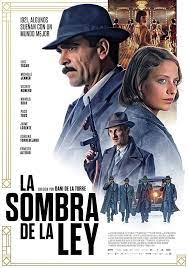
GUN CITY / LA SOMBRA DE LA LEY
Spain, 2018, 126 minutes, Colour.
Luis Tosar, Michelle Jenner, Vicente Romero, Manolo Solo, Parco Tous, Jaimi Lorente.
Directed by Dani de la Torre.
This is a striking political drama about an era in 20th century Spanish history that most non-Spaniards would not know of. It precedes the Civil War by more than a decade.
The city is Barcelona – with images of the County Cathedral still being constructed.
This is a film about politics and the police, the background of the Army and possible interventions.
The central character is rather mysterious in his entry, referred to as the Basque, joining with the local police, sharing their brutal methods, even executions. The audience sees a local police group, vigilante in its behaviour, with corrupt connections to a nightclub owner – a lavish club where wealthy celebrities of the city congregate, enjoy lavish meals, stage shows. He is called The Baron.
Military authorities in the area are ready to take over – especially with the opening sequence of a train being waylaid by armed forces and the stealing of the gun cargo from the train. The arms seem to disappear, some reappearing, The Basque intent on discovering where they were. On the other hand, the police chief of the area is a man of integrity and wants to investigate and discover the truth.
Also highlighted are the so-called anarchists, mainly union men and women who are demonstrating against injustices in the workplace. Some are in favour of peaceful negotiations. But, there are also some strong militants.
Much of this comes to a head towards the end of the film, riots, weapons used against the anarchists, the influence of the authorities and the military. There is also a revelation of who The Basque is and his mission in the turmoil of the early 1920s in northern Spain.
- Revisiting Spanish history, the early 1920s? The consequences for government in Spain, the monarchy, the buildup to the 1930s and the civil war?
- Barcelona in the early 1920s, the vistas of the city, overviews, the Mediterranean, the wharfs? The streets, buildings? Police headquarters? Government headquarters? The nightclubs and the extensive entertainment area? The Spanish countryside? The musical score? The building of the Gaudi Cathedral?
- The political situation? Anarchists and social movements? The role of the police? Military authority? The potential for Civil War?
- The opening, the fire, the attack on the train, stealing the arms? The mystery? Police investigation?
- Annibale Uriarte, mysterious presence, serious character, strong, from Madrid, joining the Inspector and his group, the torturing of the driver, killing him? His participation in the investigations? Strong arm tactics?
- The inspector, his personality, his two associates, TB and his propensity for torture, brutality? The officer and his notebook – and the later revelations? Their domination, arrests, interrogations? Brutality? Uriarte and his presence with them, participating?
- The anarchists, Leon and his militancy, Sara and her participating? The women, in the uniforms, the quiet demonstration, the cause, the Inspector and the arrests, Sara, the death of her friend? Her militancy? Salvador and his wanting dialogue, the spread of the trade unions, their causes?
- The military governor, his ambitions? The issue of the arms? The local police chief, his integrity, against brutality? The interactions with the Inspector and his group?
- The Baron, the nightclub, the range of patrons, the owner of the factory, the dancers, Lola, the star? The Baron and his power, seedy connections, the tradesmen and exploding as little girl in the sex films, Lola protecting her? The Majorcan and his being the henchman? The accountant, his connections, Lola and her pregnancy, defying the Baron? The accountant being murdered? The connections with the Inspector? Uriarte and his collaborating with the Baron? The issue of the arms of the deals?
- Uriarte, his ambiguity, helping Sara and the anarchists, the battle and the melee? The revelation about who he was, his military background? In the church, the interview with the Minister, the discussions about national security? His return, with the Baron, discovering the weapons? At the nightclub? Leon and the attack, trying to buy arms, Sara’s presence? Uriarte and his interventions? His being wounded? Sara helping him?
- The death of Salvador, Leon and his executing him, to force armed confrontation? Sara, her reaction, buying the arms at the nightclub, the realisation of the troops, killing Leon?
- Lola, Uriarte’s warning about The Baron and his killing the accountant? Her shooting him?
- The role of the military, the role of the police, corruption and integrity? A portrait of Spain in the early 1920s?
All at Sea
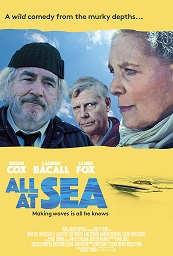
ALL AT SEA
Norway, UK, 2010, 88 minutes, Colour.
Brian Cox, Lauren Bacall, James Fox, Hege Schoyen, Kare Conradi, Ingrid Bolse Berdal.
Directed by Robert Young.
Originally a London play, Wild Blue Yonder, by Robert Janes, the playwright adapted his work for the screen. Most of the filming was done in 2007. However, there were financial difficulties and editing and the release of the film delayed for several years.
Is an unusual Norwegian-British production, with Scots Brian Cox in the central role, American Lauren Bacall, English James Fox and a Norwegian cast. The setting is on the West Coast of Norway, a town, a centre for smuggling, the venue for a home for the aged. (An interesting comparison is the 2021 French film, the Villa with Kev James and Gerard Depardieu.)
This is a very broad comedy, played for farce rather than subtlety. Brian Cox who had established himself in the UK and the US as a versatile character actor and who was to consolidate this reputation in the coming years, especially in the television series, Succession, looks rather wild, behaves in a rather wild way, is shrewd despite his bumbling and intrusions.
At the centre of the story is the death of his friend, both seamen, wanting a burial at sea but thwarted by the autocratic head of the home for the aged. There are some farcical scenes at the cemetery. There are some farcical scenes at the home. At the home is an American widow played by Lauren Bacall. And a military widower also comes in order to write a book. He is played by James Fox.
The latter part of the film shows the attempts to get the burial at sea, the intrusion into the wrong funeral and the church, the escape from the home for the aged, all kinds of manipulations to find and recover the coffin of the dead man – and final success.
An easy farcical comic pastime.
- Based on a play, Wild Blue Yonder? The strong cast? Delays in production and release? The UK contribution? Norwegian contribution?
- The Norwegian locations, at sea, the details of smuggling, harbour supervision, life in the town, the home for the elderly? Musical score?
- The comedy, farce rather than subtle, broad laughter?
- The introduction to Wally, participating in the smuggling, the various people involved, the detail of the sailing, the boat, hiding from the Coast Guard? The news of the death of his friend, the long friendship? Living in the home for the aged? The antagonism with Reimark? Wally and his manner, appearance, gruff, comic? At the home, defying the authorities? The friendship with Mae? His friend’s death, the funeral and his not being told, wanting his friend to be buried at sea, the intrusion at the funeral, the hole in the coffin, driving off with the coffin?
- Nina, her place in the town, knowledge of the smuggling, help, friendship with Wally, the attraction to Ben, his work? Her contribution to recovering the coffin? And the burial at sea? Ben and his friendship, agreement, working the crane?
- George and his arrival, military, proper, widower, writing his book? With Reimark? The introduction, her rules, the room not ready, his having to share with Wally, the contrast, the odd couple, Wally getting in the window, the beds, the demarcation, the music, the snoring? The strange friendship between the two? George and his finally collaborating in the plan for the funeral, finding the coffin, helping Wally escape, the plans and details, George going with him, Nina and Ben, the finding of the coffin?
- Reimark, her management of the home, her demands, authoritarian? Reactions? The visit from the authorities, Wally and his spoiling the show, the authorities threatening her?
- Mae, American, widow, in Norway, friendship with the men, collaboration and the plan?
- Wally, going to the church, interrupting the funeral? The irony of the minister falling into the grave at first, being lifted out? The second funeral and Wally bumping his arm in the sling?
- The final plan, the finding of the will, George, in the rubbish, the revelation to Wally? Getting the coffin, the boat, and the ritual of burial at sea?
Hora Final, La/ The Last Hour
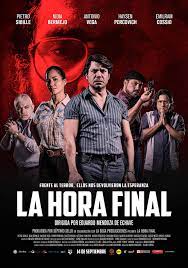
LA HORAL FINAL/ THE LAST HOUR
Peru, 2017, 117 minutes, Colour.
Pietro Sibille. Nidia Bermejo, Tommy Parraga.
Directed by Eduardo Mendoza de Echave.
To appreciate this story of Peruvian politics in the early 1990s, it is recommended to do a bit of historical research before watching. Research will indicate something of the social situations of the 1970s, the emergence of the revolutionary Maoist Shining Path movement and some of its violent consequences. It would also indicate the political moves against Shining Path, especially in tracking down its leader and bring him to justice in the early 1990s.
This is a fictionalised version of the search for the leader, the detective work of the special force investigating rebels. They work in parallel, not always in agreement with, the governmental Secret Service.
The story is personalised with a focus on one of the detectives, committed to his work, especially in cover work in the Andes for several years where he met his wife, but they are now estranged, his wanting some more contact with his son. The other detective is of native Indian background, a nurse becoming a policewoman, concerned about the disappearance of her teacher mother, the collapse of her father, and her younger brother ideal logically committed to Shining Path.
The film offers the scope of those sympathetic to the movement, including various academics. There is a great deal of surveillance going on, agents with cameras in large bags, some IT coordination in the style of the 1990s.
And, eventually, mission accomplished. Some of the commentators, depending on their political stances, question the stances of the filmmaker.
- Peru in the latter 20th century, social upheaval, The Shining Path?
- Audience knowledge of Peruvian history, the 1980s, upheaval, Guzman and The Shining Path, Maoist revolution, Guzman in hiding, the various attempts to find him?
- Atmosphere of the period, Lima, the city, the streets and homes, surveillance? Official offices? Torture rooms? Going out of the city, the bus rides, cars, the ports, factories? The musical score?
- The focus on Zambrano, the opening, alone, health, the background of his marriage, the shared experiences with his wife in the mountains, their son, her wanting to leave Peru, a lawyer and the relationship, his relationship with his son, the meetings, homework, sport, the son curious about his work? His carelessness, driving, the crash, the confrontation with the owner, money difficulties, payment of rent?
- The organisation, the head, the team, the range of people, men and women, in the office, technicians, surveillance, cameras in bags? The targets, following them, techniques to avoid discovery?
- Gabriella, the nurse, treating victims, deciding to join the police? Her indigenous background? The story of her family, teacher mother and disappearance, the father and his despair, the younger brother, her finding him, his allegiance to Shining Path, her following him, the discussions, his ideology, avoiding his sister, her finding him, with the bomb in the car, the explosion, the dead? Her arresting her brother?
- The various links to Shining Path, the Academy and paying the rent to the German lady, the students, the protests and demonstrations, blocking Zambrano’s driving through? Arana, under suspicion, surveillance, the bags, the money?
- Zambrano and Gabriella, the attraction, the relationship? Her not revealing the truth about her brother, Zambrano and distrust? Their being pursued by the Intelligence Office, they’re being tortured? Zambrano, the document, the pen and the attack, Gabriella hanged, her interrogator and his sexual activity? The rescue? Under suspicion from the boss, being followed?
- The raid on the house, all the Maoist paraphernalia? The videocassettes, Zambrano watching, the focus on Guzman?
- Trailing drivers, finding the house, the decision to raid, the taking of Guzman?
- The perspectives of the film director, sympathies and interests, Peru, social issues, the economy, rich and poor, revolutions, intelligence agencies?
Girl at the Window
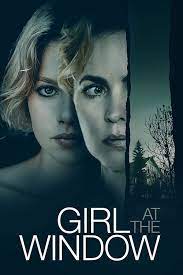
GIRL AT THE WINDOW
Australia, 2022, 88 minutes, Colour.
Radha Mitchell, Ella Newton, Vince Colosimo, James Mackay.
Directed by Mark Hartley.
This is a low-budget thriller led by the strong Australian cast, Radha Mitchell as a mother, Ella Newton as a disturbed daughter Amy, Vince Colosimo as the suspicious neighbour. It is a story about a serial killer and abductions.
Some years ago, the director of this film, Mark Hartley, made an award-winning documentary about small-budget Australian horror films and thrillers, Not Quite Hollywood (including commentary from Quentin Tarantino). Hartley was exploring the Australian film industry and the range of films which could be described as “schlock-horror”. These are the kinds of thrillers that used to be shown at drive-ins, were popular with groups watching them on television and, later, on streaming. It is interesting to note the definition of schlock-horror: A genre of low-budget horror films characterized by sensational plots and lurid special effects.
Which means that Girl at the Window needs to be reviewed with an understanding of the genre and its conventions, that it is not meant to be a classy, well-thought-out psychological drama, crime, clues and detection. Rather, it is presented as over the top, situations, characters, reactions, and the touch of grisly murders.
Girl at the Window works rather well at this level – which does not mean that this is a recommendation for everyone to see it. Rather, fans of such films will probably find it above average of its kind.
There is the advantage that it was filmed in Ballarat, some fine views of the city, the buildings, memories of the past, and the surrounding bush. The focus is on a young girl, bereft at the accidental death of her father, mentally disturbed, blaming herself, yet going to school and studying. She and her mother have moved from the city out to the bush, abandoned mines area.
Amy has nightmares, imagines people present, acts on her suspicions of the neighbour as if she were paranoid Nancy Drew – with some dire consequences.
There is a twist at the middle, a revelation about the mysterious serial killer, some scenes of peril involving her mother and schoolfriend, interventions by detectives.
So, for its limited audience, a pastime movie entertainment in the schlock horror vein – and an immediate candidate for Mark Hartley’s sequel, Not Quite Hollywood 2.
- Schlock-horror entertainment? To be judged by the genre and its conventions rather than as a thriller?
- The Ballarat setting, the vistas of the city and its buildings, streets? The surrounding countryside? The bush? Mines? Homes, underground mines and shafts? The musical score?
- The background, Amy, her relationship with her father, birdwatching, his accidental death, falling down the mine, her inability to help, blaming herself? The experience of the abductions and the serial killer? Preying on her mind, imagination, her dreams? Seeing people present? At home with her mother, moving out of the city? Not able to sleep, noting the van, writing down the times? Chris, neighbour, suspicions? Her intrusion, the clash with him, injuries? Her mother wanting her to apologise? His going out with her mother?
- At school, with her friend, the essay on Macbeth, the discussions with the teacher, his comments on her assignment, identifying with the killer? Her friend and her dates, cheeky, the police interrupting them, spending the night at the station? The phone calls, her exasperation with Amy, yet helping her?
- Amy, the contact with the detective, his response, his assistant, listening, the notebook and dates?
- Amy intruding again, into the house, fearful of Chris, getting into the van, the wrapped limb and blood, going out to the bush, his throwing the limb away? The return, her banging, getting out of the van, opening the door, with the weapon, his being shot?
- The background of the abductions, the news on television, the list of those abducted, Susan, being seen in the cage in the mine shaft? The screams?
- The consequences, the detective taken off the case, the new detectives, the interviews? Amy and her determination? Yet the appearances of the teacher, disappearances?
- The taking of her mother, her friend and the boyfriend, entry, his being killed? His body removed? The two women bound, in the cellar?
- Amy, going into the house, the confrontation with the teacher, the serial killer, mad and bad, the fights, his overcoming her, her letting him be impaled?
- The detectives, the recovery, her friend, her mother, the reconciliation?
Bosch & Rockit
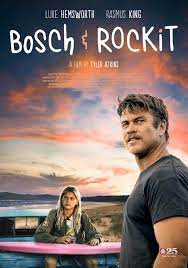
BOSCH & ROCKIT
Australia, 2021, 106 minutes, Colour.
Luke Hemsworth, Rasmus King, Isabel Lucas, Leeanna Walsman, Savannah La Rain, Heather Mitchell, Martin Sacks.
Directed by Tyler Atkins.
There was a time in Australian history, thinking back to the 1950s, when we expected families to be a united group, no separations or divorces, the bonding between parents and children, loving obedience from children to parents. But, we might ask, was it ever so?
These questions are significant for this story of a father and son, Bosch, Luke Hemsworth, the father and Rasmus King, Rockit, the son. The mother has walked out on them years earlier. Perhaps a more realistic scenario these days.
There are two strands of the story going on and audience response will depend on which strand they find the more interesting, the strand they relate with better, become emotionally involved.
Taking the title, there is the Bosch strand. It turns out that he has an extraordinarily large marijuana plantation out in the New South Wales countryside. He has a team of mates working with him, rough and tumble despite the money that they are making. His son Rockit lives with him but knows nothing of the marijuana, spending a lot of his time surfing (and his father joining him in the surfing). The film becomes something of a drama when corrupt police want to persuade Bosch to cut in market cocaine and he refuses, under threat from the police, then the plantation engulfed by a bushfire and his having to take the money and run. So his story involves taking Rockit for a holiday to Byron Bay, staying undercover, the police in pursuit, his trying to do the best by his son but the corrupt police pursuing him.
On the other hand, because Rockit is such a strong screen presence, and this is a story of a teenager who has memories of his mother but she has left him, admires his father, loves the surf, doesn’t do well at school because he can’t read well and is bullied, called Dumdum, is delighted when his father takes him to Byron Bay for a holiday, meets a young girl and they become friends, rocket having no idea about what his father really does and prone to believe his father story that he is actually a spy and bound to secrecy. For a time, he is with his mother, but she drinks, he clashes with her.
So, the combination of drug dealer, police pursuit and intervention and the story of an adolescent boy. And, filmed attractively in the countryside, at Byron Bay and Brunswick Heads.
In checking on whether Rasmus King does his own surfing or has a surf double, it emerges that he comes from a surfing family, actually from Byron Bay, his older brother a qualified champion and the family move around Australia and to the US to the various venues for surfing competitions. Rasmus King does his own surfing.
This is not a film that stands out and demands to be seen. And, there is a great deal of ambiguity in the character of Bosch and his relationship with his son and his former criminal activities. But, it looks good, and raises, without solving, the issues of parenting and the influence on children.
- The title and expectations? Names for father and son? The tone?
- The colourful locations, country towns, homes and schools, the marijuana plantation, the sorting centre? Driving through the countryside? Byron Bay, the coast? Brunswick Heads? The musical score?
- The importance of surfing, the surfing sequences, the beaches, the waves, the atmosphere of the coast? Rasmus King and his surfing?
- Audience interest in Bosch’s story, Rockit’s story?
- Rockit’s story, his age, at school, being called dumdum, not fighting back, his father urging him to fight, sending the student to hospital? Avoiding school? His not being able to read? His missing his mother, memories of her, her disappearance, wanting to see her again? His bond with his father, not knowing about the marijuana? Spending his time surfing? His skill?
- Bosch’s story, the plantation, extensive, the range of workers, ordinary mates? The money? The corrupt police, his friend from school, the pressure to cut and sell the cocaine, his refusal? His bond with Rockit, concern, surfing with him? The fire, the destruction, his getting as much money as possible, the cocaine? Driving away?
- Father and son, escaping the law, escaping the corrupt police, going to Byron Bay, the enjoyment of camping on the beach, the surfing?
- And with Deb, the photos, her mother, the hotel, booking in, Deb and her friendship, the relationship with Bosch? With Rockit? The easy life, the surfing, driving to Brunswick Heads?
- The arrival of the corrupt police, the pressure on Bosch, the attack, his having to escape again? The boss and his pressure on the younger man, abusive, threats, the friend and his taking the gun to Bosch, unable to shoot him? The phone call, and his putting in the corrupt boss?
- Rockit, at Byron Bay, the meeting with Ash, at the hotel, going for walks, the attraction, friendship, his calling her Ash Ash, spending the time together, ice cream, their confiding in each other, her background, his mother? Her having to leave?
- His father, the story about his being a spy? Rockit believing it? His father taking him to his mother, a character, drinking, taking him in, unable to deal with him, his response to her, the clashes?
- Her taking him to his uncle? The prawns, the boat? In fact going to his father? Her being unable to handle him?
- Rockit and his going to the boat, getting the jobs, enjoying the work? Seeing the boat for Fiji, the possibility for his father’s escape? His finding out the truth, disillusioned with his father, yet loving him?
- The chance encounter with Ash again, their bonding again, the touch of love, the kiss?
- Rockit farewelling his father, his father safety, Rockit and his future?
Master Z - the Ip Man Legacy
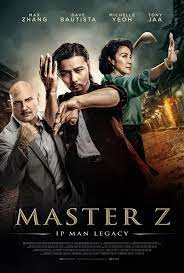
MASTER Z: THE IP MAN LEGACY
Hong Kong, 2018, 108 minutes, Colour.
Jin Zhang, Dave Bautista, Michelle Yeoh, Tony Jaa, Brian Thomas Burrell, Chrissie Chau, Kevin Cheng, Yan Liu.
Directed by Woo-Pinig Yuen.
For a period of over 10 years, audiences enjoyed films, featuring Donnie Yen as Ip Man, which traced his career from prewar years, the war period and Hong Kong after the war.
In 2018, a character from these films, Cheung, who had been a martial arts teacher and had rivalled Ip Man but in a private fight with him, lost and decided to retire.
This is his story, along with his son, in rather drab Hong Kong in the postwar years, trying to make a living as a shopkeeper, giving up on his past and his martial arts skills and teaching. However, it is a period of gangsters and the triads, of these characters throwing their weight around, setting fire to businesses as revenge, groups of thugs ready for fights.
By chance, as he is making shop deliveries, Cheung encounters two women being pressurised by a sadistic Kit, brother of the head of the triad (who is played by Michelle Yeoh, always dignified and a strong presence, and having the opportunity for some martial arts herself). The incident means that Cheung has to fight, but Kit orders his shop burnt and he and his son are given refuge by one of the women whom he saved earlier, whose brother runs a significant bar in Hong Kong.
Which means then that there will be further encounters, quite a number of interestingly choreographed fights, chilling with Kit’s thugs, Julia’s brother, Fu, also fighting, and an encounter with an expatriate, Owen Davidson, played by Dave Bautista, charming with his restaurant and cooking, a high reputation as he supervises an auction for charity, but, actually, a drug dealer who pays off the police (a very unflattering picture of British police force in colonial domineering attitudes).
There is quite some sentiment in the relationship between father and son. There are some comic moments. But, eventually, there is a buildup to a confrontation with Owen Davidson and some more fighting – and an expose and the turning of the tables against the corrupt British police.
Very entertaining in its way.
- Memories of Ip Man? His legacy? The films? This film as a spin-off?
- Hong Kong, the postwar period, the local population, British rule? Corrupt police? The triads? The world of gangsters, business, moneymaking? Pressure on ordinary citizens? And the tradition of martial arts, teachers?
- The background of Cheung, the flashbacks to past films, his skills, a teacher, the fight with Ip Man, defeat, withdrawing, with his son?
- Setting up in Hong Kong, the shop, his business, the deliveries, the bond with his son, happy, joking, breakfast? Buying the toy for his birthday? The chance encounter with the young women, his defence of them, the thugs, the confrontation with Kit? The police, corrupt, arresting everyone, the interrogations, the officials letting the men go? His eventual release? Getting dressed up for the dinner, too late, the encounter with Owen Davidson, his promise of a good meal?
- The choreography for the fights, their insertion into the action, with Kit and his thugs, eventually with Owen Davidson, the fight with Fu, Fu fighting and his death? The culminating fight, in the streets? The fight with Kwan?
- The fire, Kit and his thugs, the son taken to hospital, Julia and her help, taking them to the club, Fu, accommodation, Cheung working as a waiter, the dominance of the foreign visitor?
- The triad, Kwan, matriarch, traditions from her father, dealing with Kit, the board meeting, declaration that they would go to legitimate, the discussions, the vote of the board? Her trying to control Kit? Going to the auction, buying the vase, her being denounced? The visit of the club, the discussions with Cheung, the cheque in payment, his reaction? The later confrontation and martial arts fight with her?
- Owned Davidson, the host, his cooking, the birthday party? The auction, his chairing? The reality of his drug dealing, the money to the police chief, kit and the heroine, the buildup to the confrontations? With Fu, the fight? Killing him? Attempting to leave, Cheung and his accosting him, the fight, in the streets, his being killed by the hitman on behalf of Kwan?
- Cheung, a man of integrity, his memories of the past, the relationship with Julia, trying to help and Nana, her being overwhelmed by Kit and his men and her dying? The bond with Fu, the fight? His death? Preserving his son?
- Ultimate action, the confrontation with Kwan and Kit, his losing his arm? He and his sister leaving?
- The happy ending for Cheung and his son?